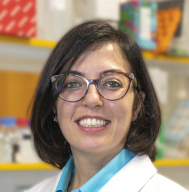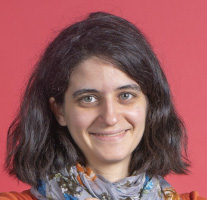

Fiorella Grandi started a postdoctoral fellowship in October 2022 in the Epigenetics and biotherapies for motor neuron disorders (ALS & SMA) group led by Piera Smeriglio. She is a laureate of the MSCA Postdoctoral Fellowships 2022 call (Marie Skłodowska-Curie Actions – Horizon Europe). Her project* focuses on the epigenetic mechanisms** that influence the efficacy of gene therapy. Interview with Fiorella Grandi and Piera Smeriglio.
Can you tell us about your background?
Fiorella Grandi: I completed my PhD in the United States, at Stanford University, on the role of epigenetics in the regulation of skeletal tissue development. During this work, I also identified a new cell subpopulation that acts as an amplifier of a skeletal pathology, osteoarthritis.
This was followed by almost 2 years of post-doctoral work at the Gladstone Institutes in California, where I was able to continue training in several cutting-edge techniques (including single-cell multiomics) in the laboratory that developed them, in order to further study epigenetics: the accessibility of chromatin and how it is altered to allow gene expression, at the level of a single cell.
As I wanted to work on rare diseases involving the central nervous system, such as motor neuron diseases, I decided to apply to the group led by P. Smeriglio, at the Research Centre of the Institute of Myology, to decipher how the epigenome responds to gene therapy (GT), using spinal muscular atrophy (SMA) as a pathology model.
How does your research fit into the group’s theme?
FG: I am trying to understand why a disease like SMA, which is due to a mutation in a gene, the same for all patients, generates such different phenotypes (children, adults, adolescents, etc.). And conversely, why in amyotrophic lateral sclerosis (ALS), different mutations can give a unique phenotype. This does not depend solely on genetics, so the idea is to determine the role of epigenetics in this variability.
The project funded by the fellowship is based on the assumption that the TG approach chosen in the laboratory can modify the epigenetics of the transduced cell. If so, how is the epigenetic barrier, which is ‘on top’ of the genes, modified to allow the gene to be repaired? We need to better understand what is happening at this level in order to be more efficient in TG.
Piera Smeriglio: This is the first time that this question has been addressed. For me, Fiorella brings a unique perspective that combines knowledge of both the cell and epigenetics, which is her strength! When we deliver a TG that has to act on different cells, we look at the epigenetic particularity of each cell. In fact, to overcome the limitations we have today, we need to improve the therapy to target specific cells.
What will this MSCA-Horizon Europe fellowship bring you?
FG: First of all, this fellowship brings visibility and fame. It allows you to benefit from a vast and rich environment around you, in addition to the environment of your own institute. It also facilitates the transition from post-doctorate to further ‘independent’ practice for the researcher, thanks in particular to the training and support offered to become a PI (Principal Investigator) in trials and research work.
PS: In my experience***, this fellowship allows you to join a strong and already well-developed international network that gives you access to experts, technologies, tools, career development opportunities… Each year, conferences are organised to bring together the new award winners from all disciplines.
Finally, having been awarded an MSCA grant also helps to obtain other European grants for future projects.
* Project : « Characterizing the chromatin landscape of Spinal Muscular Atrophy in response to AAV9 mediated gene therapy » (EpiAAVTherapy).
** Epigenetics is the study of changes in gene activity that do not involve changes in the DNA sequence and that can be transmitted during cell division.
*** Piera Smeriglio was the winner of a MSCA-H2020 fellowship in 2020.
